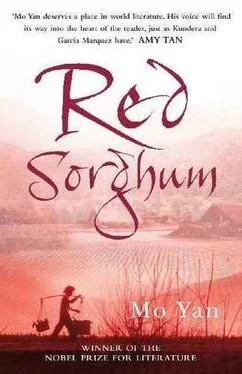Second Grandma’s fountain trick sent the hired hands running from the room in fright. ‘Run,’ she shouted, ‘run, run, you can’t get away, the monk can run but the temple will never get away!’
Uncle Arhat looked imploringly at Granddad, who returned the look, as Second Grandma’s curses grew more spirited again. Now they were accompanied by spasms in her arms and legs. ‘Jap dogs,’ she cursed, ‘Chinese dogs, in thirty years they’ll be everywhere. Yu Zhan’ao, you can’t get away. Like a toad that eats a blister beetle, the worst is yet to come for you!’
Her body arched like a bow, as though she wanted to sit up.
‘Oh no!’ Uncle Arhat gasped. ‘A sitting corpse! Quick, give me a flintstone.’
Grandma tossed him the flintstone.
Somehow Granddad found the courage to pin Second Grandma down so Uncle Arhat could press the flint down over her heart. It didn’t work.
Uncle Arhat began to back out of the room. ‘Uncle,’ Granddad said, ‘you can’t leave now!’
‘Mistress,’ Uncle Arhat said to Grandma, ‘bring me a spade, quick!’
Once Second Grandma’s chest was pressed down by the spade her body grew still. She was left in the room to suffer alone, as Grandma, Granddad, Uncle Arhat, and Father went into the yard.
‘Yu Zhan’ao,’ Second Grandma shouted from inside, ‘I want to eat a yellow-legged rooster!’
‘Take my gun and shoot one!’ Granddad said.
‘No,’ Uncle Arhat said. ‘Not now. She’s already dead!’
‘Quick, uncle,’ Grandma said, ‘think of something!’
‘Zhan’ao,’ he said, ‘I’ll go get the Taoist at Cypress Orchid Market!’
In the early hours of dawn, Second Grandma’s shouts nearly ruptured the window paper. ‘Arhat,’ she fulminated, ‘you and I are enemies who cannot live under the same sky!’
As Uncle Arhat walked into the yard with the Taoist, her curses turned to long sighs.
The seventy-year-old Taoist wore a black cassock with strange markings on the front and back. A peach-wood sword was slung over his back, and he carried a bundle in his hands.
Granddad went out to greet him and recognised him immediately as Mountain Li, the Taoist who had exorcised Second Grandma’s weasel spirit years before. He was skinnier than ever.
With his sword the Taoist cut the paper out of the window so he could look into the room. As he withdrew his head, the blood drained from his face. Bowing to Granddad, he said, ‘Manager Yu, I’m afraid my power is inadequate to deal with this evil.’
Filled with terror, Granddad pleaded, ‘Mountain, you can’t leave. You must drive it away. You will be amply rewarded.’
He blinked his demonic eyes and said, ‘All right, the Taoist will take a drink of courage and bang his head against the golden bell!’
To this day the legend of how Mountain Li exorcised Second Grandma’s demon still makes the rounds in our village.
In the legend Mountain Li, his hair a wild jumble, performs a dance of exorcism in the yard, chanting as he twirls his sword in the air, while Second Grandma lies on the kang tossing and turning, screaming and cursing.
Finally, the Taoist tells Grandma to bring him a wooden bowl, which he fills half full with clear water. He takes a potion out of his bundle and dumps it into the water, then stirs it rapidly with the tip of his wooden sword, chanting all the while. The water gets redder and redder, until it is the colour of blood. With a greasy, sweaty face, he jumps into the air, falls to the ground, and begins foaming at the mouth. Then he loses consciousness.
When the Taoist came to, Second Grandma breathed her last. The stench of her decomposing body and rotted blood floated out through the open window. When her body was put in its coffin, all the mourners held goatskin chamois soaked in sorghum wine over their noses.
Some people say that when she was placed in the coffin she was still cursing and kicking the lid.
FOR TEN YEARS I had been away from my village. Now I stood before Second Grandma’s grave, affecting the hypocritical display of affection I had learned from high society, with a body immersed so long in the filth of urban life that a foul stench oozed from my pores. I had paid my respects at many gravesites before coming to that of the woman whose short but magnificent life constitutes a page in the most heroic and most bastardly history of my hometown. Her eerie, supernatural death had awakened in the souls of Northeast Gaomi Township a mysterious emotion that germinated, grew, and became strong, flowing slowly through the memories of village elders like a sweet scarlet syrup that fortified us and made us capable of facing the world of the future.
On each of my previous visits to the village, the power of that mysterious emotion was revealed in the drunken eyes of those old-timers. Comparisons are always risky, but when I approach them logically, I discover to my horror that in my ten years away from the village I have seen eyes like that only in the fragile heads of pet rabbits, turned red by boundless desire. There are, it appears, two separate human races, each evolving in accordance with its own value system. What frightens me is that my eyes, too, have taken on that crafty look, and that I have begun to utter only the words that others have spoken, themselves repeating the words of still others. Have I no voice of my own?
Second Grandma leaps from her grave holding a golden-hued mirror, the deep lines of a mocking grin tilting the corners of her full lips. ‘You’re no grandson of mine. Look at yourself!’
Her clothes flutter, and everything is the same as when she was put in her coffin, yet she is younger and lovelier than I had imagined; the messages carried by her voice prove that she is infinitely more thoughtful and profound than I. Her thoughts are liberal, dignified, and richly resilient, yet serene and firm, whereas mine float tentatively in the air like the transparent membrane of a reed flute.
I look at my reflection in Second Grandma’s brass mirror. As I’d feared, the clever look of a pet rabbit shines in my eyes; words that belong to others, not to me, emerge from my mouth, just as the words emerging from Second Grandma’s mouth on her deathbed belonged to others, not to her. My body is covered with the seals of approval of famous people.
I am scared to death.
‘Grandson!’ she says magnanimously. ‘Come home! You’re lost if you don’t. I know you don’t want to, I know you’re scared of all the flies, of the clouds of mosquitoes, of snakes slithering across the damp sorghum soil. You revere heroes and loathe bastards, but who among us is not the “most heroic and most bastardly”? As you stand before me now, I can smell the pet-rabbit odour you brought with you from the city. Quick, jump into the Black Water River and soak there for three days and nights — I only hope that when the catfish in the river drink the stench that washes off your body they won’t grow rabbit ears!’
Second Grandma returns swiftly to her grave. The sorghum stands straight and silent; the sun’s rays are wet and scorching hot; there is no wind. The grave is covered with weeds whose fragrance fills my nostrils. It is as though nothing has happened. Off in the distance I hear the high-pitched songs of peasants tilling their fields.
The sorghum around the grave is a variety brought in from Hainan Island; the lush green sorghum now covering the rich black soil of Northeast Gaomi Township is all hybrid. The sorghum that looked like a sea of blood, whose praises I have sung over and over, has been drowned in a raging flood of revolution and no longer exists, replaced by short-stalked, thick-stemmed, broad-leafed plants covered by a white powder and topped by beards as long as dogs’ tails. High yield, with a bitter, astringent taste, it is the source of rampant constipation. With the exception of cadres above the rank of branch secretary, all the villagers’ faces are the colour of rusty iron.
Читать дальше












